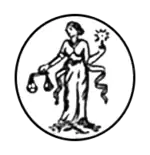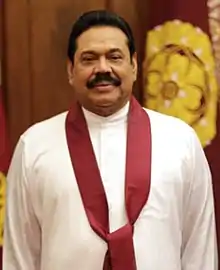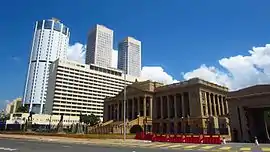Sri Lanka Law College
Sri Lanka Law College (formerly Ceylon Law College) is a Law College on Hulftsdorp Street in Colombo, Sri Lanka, established in 1874 under the then-one-year-old Council of Legal Education in order to impart a formal legal education to those who wished to become advocates and proctors in Ceylon.[1] The main building of the college was constructed in 1911.[2]
 | |
| Motto | Latin: Fiat justitia |
|---|---|
Motto in English | Let justice be done |
| Type | Public |
| Established | 1874 |
| Principal | Indira Samarasinghe PC |
| Address | 244 Hulftsdorp Street , , 6.935672°N 79.859682°E |
| Website | www |
Law education
In order to practice law in Sri Lanka, a Lawyer must be admitted and enrolled as an Attorney-at-Law of the Supreme Court. To receive admission to the bar, a law student must complete law exams held by the Sri Lanka Law College.
The course of study for law students at Sri Lanka Law College does not grant any degree or certification; however, at completion of studies, examination and a period of apprenticeship, qualifies individuals for admission to the profession as Attorney at Law. Graduates holding LLB degrees from the University of Colombo, the Open University of Sri Lanka or any other Local University or selected Partner University such as University of London, will be required to complete several examinations and the period of apprenticeship to become an Attorney-at-Law by receiving admission to the bar.
The SLLC carries out several post-attorney courses including an LLM from the University of Wales and post-attorney diplomas in intellectual property law and international trade law.
Since the late 1980s, admission has been from a very competitive entrance exam due to the high number of applicants. However, young Members of Parliament without higher educational qualifications receive direct admission without setting for the entrance exam.
Student Unions
The Law Students' Union of Sri Lanka (LSU)
.jpg.webp)
The Law Students' Union was founded in 1894 as the Ceylon Law Students' Union. The first president was Sir Ponnambalam Ramanathan, KC, CMG. The first meeting was held on June 13, 1894. With the implementation of the new rules in 1937, a student was elected as president of the L.S.U, rather than the previous practice where an experienced lawyer was appointed to that post. In 1970, the rules were further amended to give the student community greater control over their own affairs. Since that time another amendment was made creating the posts of Social and Welfare Secretary and that of editorial assistant. However, this amendment has not been put down in writing, and has been carried out by convention.
In 1991, the union amended its rules further to create the posts of Education Secretary and Assistant Education Secretary in order to protect and safeguard the educational necessities of the student community. The rules were also translated into Sinhala by the Law Students' Union of 1989 and 1991. In 1995 the rules were amended which resulted changing the name to the Law Students' Union of Sri Lanka. This amendment also created the law students' sports fund.
The Law Students' Sinhala Union of Sri Lanka (LSSU)
Sri Lanka Law College, which was established in 1874, is one of the oldest and leading professional educational institution of Sri Lanka and operating within it is the Law Students' Sinhala Union which can be introduced as one of the leading student unions with a history of dedicated service to law students for the past 73 years.
The law student Sinhala Union was established in 1943, in the wake of a renaissance against colonialism, when people irrespective of their race or religion joining hands together in the struggle for independence. Thus it was this Union that spearheaded the law students' contribution to this movement. The Law Students' Sinhala Union which was hence established was formalised and re-structured as an organised student union by Dr. C. Ananda Grero.
Notable alumni
As one of the oldest professional training bodies it has trained all the lawyers in the country who have served not only in the field of law but also various other fields such as politics, social reforms, commerce, trade unions and religion. For instance, two of the five Executive Presidents and Prime Minister Ranil Wickramasinghe had their higher education and training at the Sri Lanka Law College.
.jpg.webp)

- President Junius Richard Jayewardene - First executive President of Sri Lanka.
- President Mahinda Rajapaksa - Former (5th) Executive President of Sri Lanka.
- Hon. Ranil Wickramasinghe - Prime Minister.
- E. W. Perera - independence activist and senator.
- Hon. Gamini Dissanayake - former cabinet minister, and a presidential candidate.
- Hon. Justice Parinda Ranasinghe - former Chief Justice of Sri Lanka[3]
- Hon. Justice Sri Lankabhimanya Christopher Weeramantry - former Judge of the International Court of Justice and Judge of the Supreme Court of Sri Lanka
- Hon. Justice J. F. A. Soza - former Judge of the Supreme Court of Sri Lanka
- Hon. Justice Sarath N. Silva - former Chief Justice of Sri Lanka
- Hon. Justice V. Manicavasagar- former Judge of the Supreme Court of Sri Lanka and Chancellor of the University of Jaffna
- Hon. Justice Shirani Tilakawardene - Judge of the Supreme Court of Sri Lank
- Hon. Justice Saleem Marsoof, PC - Judge of the Supreme Court of Sri Lanka and
- Hon. Justice Siva Selliah - former Judge of the Court of Appeal of Sri Lanka
- Sarath Ambepitiya - former Judge of the High Court of Colombo
- Dr. Harry Wilfred Jayewardene, QC - former President Sri Lanka Bar Association, Chairman Industrial Disputes Commission, UN Human Rights Commission
- Hon. Dappula de Livera - Attorney General of Sri Lanka
- Senator Somasundaram Nadesan, QC - former Senator & President of the Bar Council
- Hon. H. Sri Nissanka, QC - Member of Parliament
- Hon. Dilan Perera - Current Minister of Port Development
- Hon. Jeyaraj Fernandopulle - former cabinet minister and a Member of Parliament
- Hon. Rohitha Bogollagama - former cabinet minister and a Member of Parliament
- Hemantha Warnakulasuriya, PC -Sri Lankan Ambassador to Italy
- Jayathri Samarakone - Sri Lankan High Commissioner to Singapore
- Lasantha Wickrematunge - journalist and former editor-in-chief of The Sunday Leader
- Brigadier Donald Hewagama
- Justice Priyantha Jayawardena
- Namel Weeramuni
Partner universities
See also
References
- Historical Overview of Education in Sri Lanka, Ministry of Education Archived 2007-07-16 at the Wayback Machine
- "Principal's address on Award Ceremony 2011" (PDF). Archived from the original (PDF) on 2012-07-10.
- The rise of Sinhala in our courts – Part II
